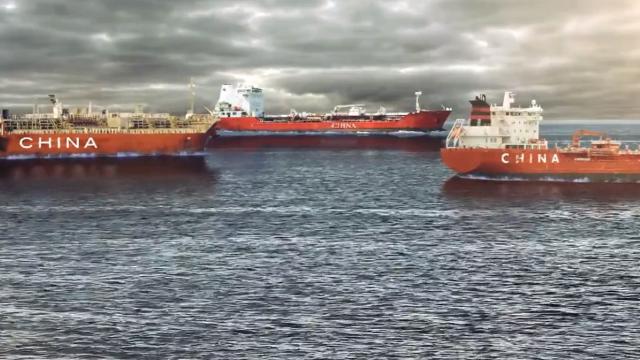
On January 28, California environmental activist and billionaire money-manager Tom Steyer aired a national anti-Keystone XL pipeline ad before and after the State of the Union Address on MSNBC. The one-minute ad, titled “Suckers” and produced by Steyer’s NexGen Climate group, sidelines climate change opting instead for McCarthy-Era anti-Chinese imagery that preys on the presumed prejudice of an uninformed public.
The ad begins with nerve-wracking music and a photo of Canadian Prime Minister Stephen Harper and Chinese Premier Wen Jiabao smiling and shaking hands. We then watch a Canadian maple leaf flag morph into the Chinese five stars as it flutters over the Martian landscape of tar sands excavation. A male narrator informs us that Keystone XL is “a sucker punch to America’s heartland,” because China is “counting on the U.S. to approve Canada’s pipeline to ship oil through America’s heartland, and out to foreign countries like theirs.”
This time last year, I was knocking on doors near the capitol house in Olympia, Wash., asking if people wanted yard signs that read NO COAL EXPORTS, WE CAN DO BETTER. The legislative session was about to begin and it seemed like a good idea to alert lawmakers to the public sentiments about these coal export proposals. I was prepared to discuss the topic with skeptics, cynics and folks who supported coal exports, but one gentleman caught me off guard.
“I’ve heard about that,“ he said, careful not to open the door too wide. “I’ll ask my wife. You know the coal’s all headed to China. They think they deserve our quality of life now.“ He continued to detail for me things the Chinese thought they deserved: air conditioning, cars, television, our jobs. He did not take a sign from me, but he was quite riled up by the time I excused myself and he shut the door.
There is an abundance of reasons to oppose fossil fuel extraction and export. We often find ourselves working side by side with activists whose motivation bears no resemblance to our own. But anti-Chinese sentiment slows us down when it lurks in the climate change conversation: it’s a cheater’s tool no matter what position it is used to defend.
Perhaps the most familiar manifestation of this rhetoric in the climate conversation is as a diversionary tactic by those who would wish to do nothing. Why should we bother reducing our CO2, when China is polluting more? Paul Street gave it the acerbic nickname “the Blame-China Syndrome“ in his introduction to the World Development Movement’s 2007 paper “Blame It on China?“, which soundly debunks the argument that China is more responsible for the climate crisis than is the industrialized West.
Another common form of message manipulation is to claim that by exporting coal, oil and liquefied natural gas (LNG) we are doing a favor to our poor, backward Chinese friends. At a public hearing in Tacoma, Wash., Rep. Paul Harris testified in favor of a limited scope of environmental review for the Millennium Bulk terminal, arguing that “We have a third world country that wants to have some of the things that we have. And maybe we should look at giving them the technology on the scrubbers.”
It’s no surprise when apathetic people or fossil fuel enthusiasts invoke stereotypes to argue their positions, but my invidious neighbor and Tom Steyer’s prejudiced approaches to a progressive cause are not unusual either. And whereas my neighbor argued his point with conviction, it seems likely that Steyer is deploying sinister-China imagery in order to mobilize people unconcerned with his real issue: climate change. In considering the severity of the climate crisis and the scale of inaction, these fast-and-dirty means can be seductive, and seem justifiable.
The West Coast left has a history of strategic anti-Chinese sentiment that goes back to the mid-to-late 1800s, when a wave of Chinese immigrants became the fall guys for the growing labor movement, which unified around racist rhetoric, policy and violence. My great uncle, historian Alexander Saxton, described these struggles in a 1971 book, The Indispensable Enemy: Labor and the Anti-Chinese Movement in California:
“In 1867, California Democrats launched their offensive against the Chinese. The result…was a bonanza. The party laid hands on an issue of enormous potential in its own right—a new issue, uncontaminated by the sad history of civil war, yet evocative of that entire syndrome of hatreds and loyalties which still could not quite openly be declared.”
The Democrats’ strategy made them popular with the white labor force, already primed for racism by the recent war, because “despite their own differences, they believed that a greater difference separated them from the Chinese.” The white workers were aware of class exploitation: “they considered themselves under attack on two fronts, or more aptly from above and below. But when they struck back, they generally struck at the Chinese.” A “solidarity” movement became defined by exclusion, in part because of media manipulation.
“Suckers” premiered three days before the State Department released its controversial Final Environmental Impact Statement, a document prepared by Environmental Resources Management Inc. (ERM), a consultant with established ties to the American Petroleum Institute and TransCanada.
According to climate champion and 350.org founder Bill McKibben, “This [report] didn’t do what all the ones before had done and say that there would be no significant environmental impact from Keystone. Nobody believes that anymore. In fact, the report said that in a scenario where you tried to do something about climate or you tried to constrain carbon, then this would be a serious problem, this pipeline bringing 800,000 barrels of oil a day down from Canada.”
But the report omits many of the worst possible impacts and serious considerations, giving President Obama another opportunity to pretend that he can both build fossil fuel infrastructure and be serious about climate change – if he chooses to take it.
If Obama approves the Keystone XL pipeline, it won’t be because he was suckered into it by Canadian and Chinese trickery, or that he was fooled by a compromised or insufficient environmental review. It will be because the corporate short-game has eclipsed a politics of reality. He will be publicly declaring that his loyalties are with Big Oil, Big Money, not with the ensured survival of our species and countless others.
Steyer’s ad claims that China is “counting on the US to approve Canada’s pipeline to ship oil through America’s heartland, and out to foreign countries like theirs.” Aside from the question of what is a foreign country like theirs, the most problematic aspect here is the limited focus on one group of investors to the exclusion of the big picture, which is that multinational corporations with interests in all three countries (and many others) are looking to continue digging, shipping and burning fossil fuels while global weather distorts and the oceans sour.
It may seem expedient now to whip up an anti-Chinese froth, but as uncle Alex put it, “tactics… have a way of becoming habits.” Whatever groundwork of allies and animosities we lay now will be the foundation of what must be a long-term movement.
The United States and China put every other nation to shame when it comes to carbon emissions, and our economies are deeply, perversely intertwined. When we point to a scapegoat, caricaturing China as a fuel-hungry monolith, we are shirking our own responsibility to act, willfully ignoring our own immense consumption and dependence on Chinese industry (and therefore emissions), and sketching a reductive portrait of a country as large, complex and ambivalent as our own. Steyer should fight fair to hit harder.
3 WAYS TO SHOW YOUR SUPPORT
- Log in to post comments













